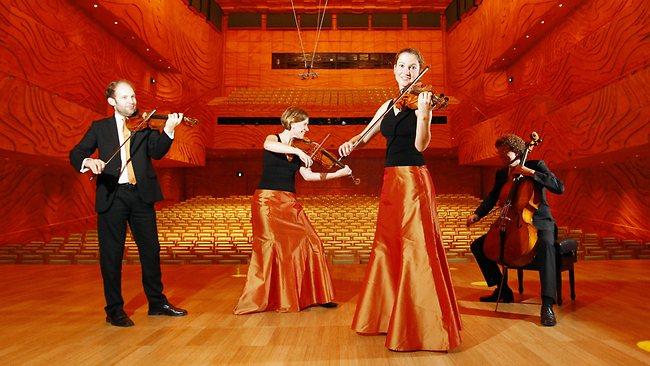Mixed judgments in the courts of popular and critical opinion
IN 1991, the Melbourne International Chamber Music Competition declared the city's aspiration to become an international chamber music capital.

IN 1991, the inaugural Melbourne International Chamber Music Competition declared the city's aspiration to become an international chamber music capital.
Two decades later, with finals at a specialist venue the competition helped inspire, on a stage named in honour of MICMC's adored patron, and in a city bustling with youthful chamber groups, the dream has become a reality.
Such competitions have their detractors. Music is not sport. Musical success is measured in the capacity to move and inspire an audience, not in trophies and scores. Nevertheless, music is a competitive industry and contests provide focus, exposure and promotion opportunities for young talent. Competitions also reveal the priorities of those selecting winners. For MICMC, there are effectively three juries: an official jury of distinguished musicians and pedagogues, determining finalists, section winners and the grand prize winner; artistic staff at Musica Viva who select their winner from any of the 16 competing ensembles; and the live and radio audiences who vote on prizes for best trio and quartet.
These differing priorities were particularly apparent in a trio final that featured dramatically contrasting performances of Ravel's Piano Trio. Awarded first prize, Trio Rafale (Switzerland) delivered a precise sequence of notes, dynamics and articulations but demonstrated scant stylistic empathy. Awarded the audience prize, Trio Paul Klee (France) offered nuance, delicacy and sublime idiomatic detail but was technically inexact and, in ensemble, less cohesive.
Equally contentious was the quartet final, where audience and jury once again agreed to disagree. A popular favourite throughout the competition, the Kelemen Kvartett (Hungary) won the audience prize for an intense, highly polished rendition of Bartok's Fifth String Quartet, the first movement conveyed with mechanistic rage. The jury preferred the Amaryllis Quartet's account of Beethoven's late String Quartet in C sharp minor, a performance that was elegant and stylistically appropriate with one extraordinary exception: an inexplicably vicious, unrefined final movement.
Returning for a winner's concert to decide the grand prize, a more relaxed Trio Rafale revisited opening round repertoire, with a crisp, lyrical performance of Schumann's First Piano Trio that was well paced and attractively shaped.
The Amaryllis Quartet paired a repeat performance of Haydn's "Rider" Quartet that was lively, well-balanced and generally sophisticated with an interpretation of Ravel's String Quartet that overstated articulation, laboured over atmospheric shimmerings and lacked any sense of reverie.
While this proved sufficient to secure the Monash University Grand Prize for the Amaryllis Quartet, the differences of opinion persisted: Musica Viva made an unprecedented decision to bypass both section winners for its national touring prize.
Instead, a somewhat startled Kelemen Kvartett was called back into the spotlight, with wild applause suggesting that in this competition there were at least three "first prize" ensembles.
The Amaryllis Quartet performs at the Independent Theatre, Sydney, tonight, and on Friday at the Peninsula Community Theatre, Mornington, Victoria.


